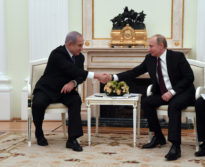As the Israeli and Russian leaders found one commonality after another between their countries in their meeting on Wednesday, it certainly didn’t look like Israel and Russia had tense relations just months ago. Israeli Prime Minister Benjamin Netanyahu highlighted that he and Russian President Vladimir Putin had met 11 times in the last three-and-a-half-years, even as this was just the second face-to-face meeting—and the first in Moscow—since Russia accused Israel of negligence that led to a Russian plane being shot down last September by Syrian air defenses, according to a report at the time by Sputnik International.
While Israel denied the claims, Russia moved forward anyway with arming the Syrians with an advanced air defense system in response to the event, per a twitter post last week from ImageSat International. Yet just five months after the incident, and there was Putin accepting an invitation to visit Israel for the dedication ceremony for a memorial in Jerusalem to those who fell during the siege of Leningrad during World War II.
The warm signals sent by Putin are key, as Netanyahu’s primary goal during the visit was battling Iran in Syria—a sensitive topic given that Russia is a major player in Syria, has ties to Iran and backs their joint ally in the Assad regime.
Ahead of his departure for the Putin meeting, Netanyahu had said in comments released by his office that stopping Iran’s “entrenching” in Syria was to be the “focus” of his talks with Putin, and even in the public portion of the meeting he made sure that was included.
“The greatest threat to stability and security in the region comes from Iran and its proxies,” Netanyahu said during his meeting with Putin, according to a press release from the Israeli’s office. “We are determined to continue our vigorous action against the attempts by Iran, which calls for our destruction, including its attempts to entrench militarily in Syria.”
In his comments prior to his leaving for Moscow, Netanyahu had noted that Iran “explicitly says that its goal is to wipe us out. You know that when I say we are acting against this, these are no empty words,” an apparent reference to the numerous Israeli strikes in Syria against Iranian forces and their agents.
During the meeting with Putin, however, Iran wasn’t the only topic. Netanyahu highlighted not only their joint memorialization of the war against the Nazis—noting roughly 500,000 Jews fought for Russia—but also the many Israelis who originally emigrated from Russia.
Putin, in comments with Netanyahu published to the Russian President’s website, also recognized the Russian Israelis. “I would like to pay tribute to the Israelis—1.5 million descendants from the former Soviet Union made a substantial contribution not only to the development of Israel but also to the birth of the Israeli statehood and are now playing a very important role as a bridge between Russia and Israel,” said Putin.
“We not only remember them but we also appreciate the role they play today. Of course, Israel is their home country, obviously, but we also call them our compatriots.”
Putin further spoke of increasing trade between the countries, noting that “it is not very large in absolute figures but the trends are positive.”
The only veiled reference Putin made to the plane incident in Syria came at the beginning of his comments, in which he noted he and Netanyahu had been planning their meeting for a while before saying that “life moves forward and requires consultations at the top level,” possibly alluding to the idea that it was time to move on from the plane tragedy.
That’s a welcome change from the openly hostile comments made by Russia’s defense minister last year, and it’s a good thing given the importance of Israel-Russian relations. Said Netanyahu to Putin on Wednesday, “The direct link between us is a vital component in preventing risks and friction between our militaries and contributes to security and stability in the region.”
(By Joshua Spurlock, www.themideastupdate.com, February 27, 2019)

